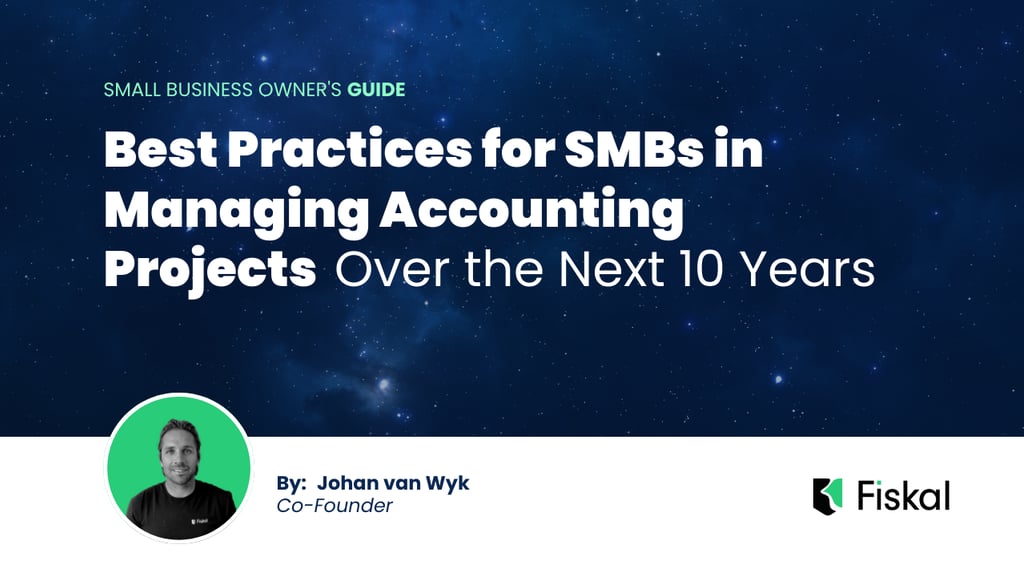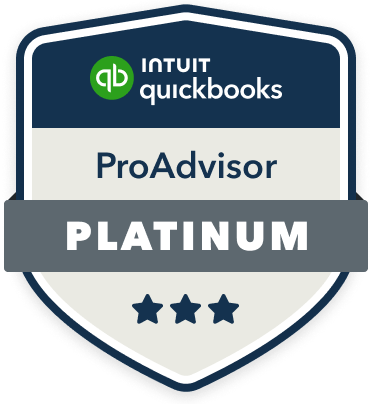Best Practices for SMBs in Managing Accounting Projects Over the Next 10 Years
The landscape of accounting for small and medium-sized businesses (SMBs) is evolving rapidly. As technology advances and regulatory requirements become more complex, SMBs need to adapt their accounting practices to stay competitive and compliant. Here are some best practices for managing accounting projects over the next decade in the USA.
SYSTEMS AND SOFTWARE


1. Embrace Cloud-Based Accounting Software
Benefits:
Accessibility: Cloud-based accounting software allows you to access financial data from anywhere, at any time.
Collaboration: Multiple users can work on the same data simultaneously, improving collaboration between team members and accountants.
Scalability: As your business grows, cloud-based solutions can easily scale to accommodate increased data and user needs.
Action Steps:
Choose a reputable cloud-based accounting software like QuickBooks, Xero or FreshBooks.
Train your team on how to use the software effectively.
Ensure regular backups and data security measures are in place.
2. Leverage Automation and AI
Benefits:
Efficiency: Automation reduces the time spent on repetitive tasks such as data entry, invoicing and payroll processing.
Accuracy: AI can help detect errors and anomalies in financial data, improving accuracy and reducing the risk of fraud.
Insights: Advanced analytics and AI can provide deeper insights into financial performance, helping you make informed decisions.
Action Steps:
Identify repetitive and time-consuming tasks that can be automated.
Implement AI-powered tools and software to enhance data analysis and reporting.
Regularly review and update your automation processes to ensure they meet your business needs.
3. Focus on Cybersecurity
Benefits:
Protection: Safeguards sensitive financial data from cyber threats.
Compliance: Ensures compliance with data protection regulations such as GDPR and CCPA.
Trust: Builds trust with customers and stakeholders by demonstrating a commitment to data security.
Action Steps:
Conduct regular cybersecurity audits to identify vulnerabilities.
Implement strong passwords, encryption and multi-factor authentication.
Provide cybersecurity training for employees to prevent phishing and other cyber threats.
4. Stay Updated on Regulatory Changes
Benefits:
Compliance: Ensures your business adheres to the latest financial reporting and tax regulations.
Avoid Penalties: Reduces the risk of fines and penalties due to non-compliance.
Reputation: Maintains your business’s reputation by demonstrating regulatory adherence.
Action Steps:
Subscribe to industry newsletters and join professional accounting organizations to stay informed about regulatory changes.
Consult with a professional accountant or tax advisor to ensure compliance with new regulations.
Implement a system for regularly reviewing and updating your accounting practices based on regulatory changes.
5. Invest in Employee Training and Development
Benefits:
Skill Enhancement: Ensures your team is proficient in the latest accounting tools and practices.
Adaptability: Prepares your team to adapt to new technologies and regulatory requirements.
Engagement: Increases employee satisfaction and retention by investing in their professional growth.
Action Steps:
Offer regular training sessions and workshops on new accounting software and practices.
Encourage employees to pursue relevant certifications and continuing education opportunities.
Create a culture of continuous learning and improvement within your accounting team.
6. Adopt Sustainable Practices
Benefits:
Reputation: Demonstrates a commitment to environmental and social responsibility.
Cost Savings: Reduces costs through energy-efficient practices and waste reduction.
Compliance: Prepares for potential future regulations on sustainability reporting.
Action Steps:
Implement paperless accounting processes to reduce waste.
Track and report on sustainability metrics such as energy usage and carbon footprint.
Explore opportunities for green investments and incentives.
7. Enhance Financial Forecasting and Planning
Benefits:
Proactive Management: Helps you anticipate and plan for future financial needs and challenges.
Informed Decisions: Provides data-driven insights for strategic decision-making.
Growth: Supports business growth by identifying opportunities for investment and expansion.
Action Steps:
Utilize financial forecasting tools and software to create detailed financial projections.
Regularly review and adjust your financial plans based on actual performance and market conditions.
Involve key stakeholders in the financial planning process to ensure alignment with business goals.
8. Foster a Strong Relationship with Your Accountant
Benefits:
Expertise: Leverages the expertise of a professional accountant to navigate complex financial and regulatory landscapes.
Support: Provides ongoing support and advice for financial decision-making.
Efficiency: Ensures accurate and timely financial reporting and tax compliance.
Action Steps:
Schedule regular meetings with your accountant to review financial performance and discuss strategic initiatives.
Share all relevant financial data and documentation with your accountant promptly.
Seek your accountant’s advice on significant financial decisions and investments.
Conclusion
Managing accounting projects effectively over the next decade requires SMBs to embrace technology, prioritize cybersecurity, stay informed about regulatory changes, invest in employee development, adopt sustainable practices, enhance financial forecasting and foster strong relationships with accountants. By implementing these best practices, SMBs can navigate the evolving accounting landscape, ensure compliance and drive business growth.












